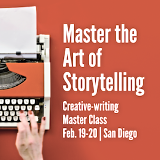3 steps to a great narrative arc
Beginning, middle, end: A chronological approach is the best way to organize most nonfiction narratives.

But chronological structure doesn’t mean that you’ll start at the beginning — say, in the maternity ward of a certain suburban Tulsa hospital in 1959 — then hash out every grunt and groan that follows. (Ever sit through a chronological recitation of someone’s vacation? “Then we had breakfast. …” Hard pass!)
Instead, move the reader from inciting incident to rising action to resolution and, finally, to denouement.
Sound complicated? It’s not.
Suddenly, luckily …
“In the first act you get your hero up a tree. The second act, you throw rocks at him. For the third act you let him down.”
— George Abbott, American theater producer and director
In fact, Roz Chast summarizes the narrative arc beautifully in a New Yorker cartoon. Called “Story Template,” it includes four panels:
- Once upon a time
- Suddenly
- Luckily
- Happily ever after
In a business context, you might translate Chast’s template to:
- Introduction (“Once upon a time”)
- Problem (“Suddenly”)
- Solution (“Luckily”)
- Results (“Happily ever after”)
Using this story structure, you can develop a narrative lead, a case study or testimonial, or a short story to illustrate your point.
Move the problem to the top.
Only I’d change one element: Start with the problem.
“When I speak to children about writing, I tell them, ‘You don’t have a story until something goes wrong.’”
— Steven James, author of Never the Same
The conflict or inciting incident is the essence of a story. So start in the middle of things, at the most dramatic part of the story.
Because you don’t have a story until you have a problem. So start with the turning point: The day the tax bill came. The day the bank called your loan. The day you learned the company had shipped its $60,000 circuit board with a fatal flaw.
But if you start with the Suddenly, where do you put the Once upon a time?
You have two options:
1. Sandwich the introduction. That gives us:
- Problem (“Suddenly”)
- Introduction (“Once upon a time”)
- Solution (“Luckily”)
- Results (“Happily ever after”)
2. Blow up the introduction. You can also explode the introduction, weaving the information parenthetically throughout the piece, for this structure:
- Problem (“Suddenly”)
- Solution (“Luckily”)
- Results (“Happily ever after”)
The story template in action
“Sometimes reality is too complex. Stories give it form.”
— Jean Luc Godard, film director, screenwriter and film critic
That’s the structure PR Manager Robert Kelley used in this piece for Verizon’s employee e-zine:
- Problem: A Montana motorist found himself at the front sales counter at the Verizon Wireless store in Missoula. Big problem: The store does not have drive-up service.
- Background (if necessary): Store Manager Heather Barnhart reported that the wayward driver fell asleep at the wheel in the wee hours of the morning and crashed through the front of her store. Fortunately, there were no injuries.
- Solution: Barnhart’s team along with Senior Analyst-Facilities Jeff Sams worked ’round-the-clock …
- Results: … to have the store open for business by the following morning.
Keep it short.
Your piece doesn’t have to be long to be good.
“I like a good story well told. That’s the reason I’m sometimes forced to tell them myself.”
— Mark Twain, American writer and wit
Chast’s simple structure is a good reminder that a great narrative can also be as short as three sentences. Give one sentence each to the problem, the solution and the result, and you have a mini parable that can help you make your point.
Anecdotes can be as long as your market, message and medium demand.
Luckily.
Master the Art of Storytelling
Want more tips and techniques for mastering “the most powerful form of human communication” — storytelling?
Save $100 with our group discounts.
|
